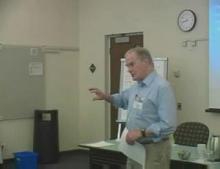Speaker A I just wanted to give you a flavor of how that collaboration worked. I think the usefulness may be that I suspect in the work we do, the that certainly is true for the work that I do. If you try and do serious consultancy work, you're always working through long term partnerships. If I look back over the last few years of my work, there's some client or champion within the client organization who's become a friend, and we work our way at a higher level on important stuff. I'd like to have you share those stories. Ken wants me to pick up some of these stories. It's not the only great collaboration, but we all do this, I think, when it works really well. So that's my gathering tower. Okay, well, let's begin with the history lesson, because that's my primary tower. I better give you the background of how I never worked with Ebenez, so my relationship with him was oblique. However, I did work with Wilfred Brown quite intensively. In fact, we produced a little book together. This book is called Bismarck to Bullock. You all know who Bismarck is. You may not know who Alan Bullock is, but he was a distinguished historian. He wrote the famous book A Study in Tyranny about Hitler. But interestingly, he chaired the great this is, I think, still available from the Anglo German Foundation. It's just a little fun book we did, which was based on a that's part of your reading. It was based on a late night, drunken conversation between Wilfred Brown and a wonderful man called Wolfgang Gershweiber, who was then the professor of political science at Mannheim University. They got drunk one night and had this conversation about how extraordinary it was that the Germans began to get the hang of industrial democracy round about the middle of the 19th century. This was an outfall of the so called professionals parliament in Frankfort. You remember the revolutionary period, 1848 49, and the the Frankfort Parliament, so called because it was pre unification that came out of this. They were all professional, academic, clever people, bit like this conference, seriously clever people gathered together and they began to formulate a form of local district and regional works councils coming to a big body. So they have the idea of industrial democracy. They've cottoned onto the idea that once your firms begin to get as big as towns, then you need formal structures of representation. You need to distinguish between decision making and policy formation. Wilson Brown always said the workers and I can't do his Scottish accent, but I wish I could he said the workers are not interested in decision making. They know that's their boss's job and they should get on with it. They do have an interest in policy formation through representation. Of course. That's the principle of that democracy. The important thing for you to understand is that long before Elliot came on the scene, wilfred Brown was making glassier, metal into a kind of working model of industrial democracy. They've been at it for ten years. So in a way, Eldritt was bent on building or and the theory sorry, Roford was bent on making industrial democracy work. So back to the history lesson. The Germans had the hang of this, at least at the thinking level, by the middle of the 19th century. And the irony is they were reading mainly Scots writers, thinking the English were doing this. Of course the English weren't. And they haven't yet. The English have not yet caught up forgive me repeating myself. Those of you that were here on legacy day, my formation of this paper is on that chart up there, which I will I have another bit of reading for you over on the left here we have the world of authority, clarity, precision, all of the things I'm sure we value. And over here we have the world of bullshit. And I'm using bullshit in a technical sense. Here with Professor Harry Frankfurt. Has anybody read his book on this? Professor Harry Franklin was professor of Philosophy at Princeton. He wrote this paper many years ago and it's called On Bullshit. And it's an extremely helpful discussion. What is the difference between hot air out and out, lying and bullshit? And it's important distinction, because if you're telling a lie, you are deliberately deceiving.

Member for
17 years 5 monthsAlistair
Last Name
Mant
User Type
Citizen Affiliate
Chairman
Socio-technical Strategy Group
